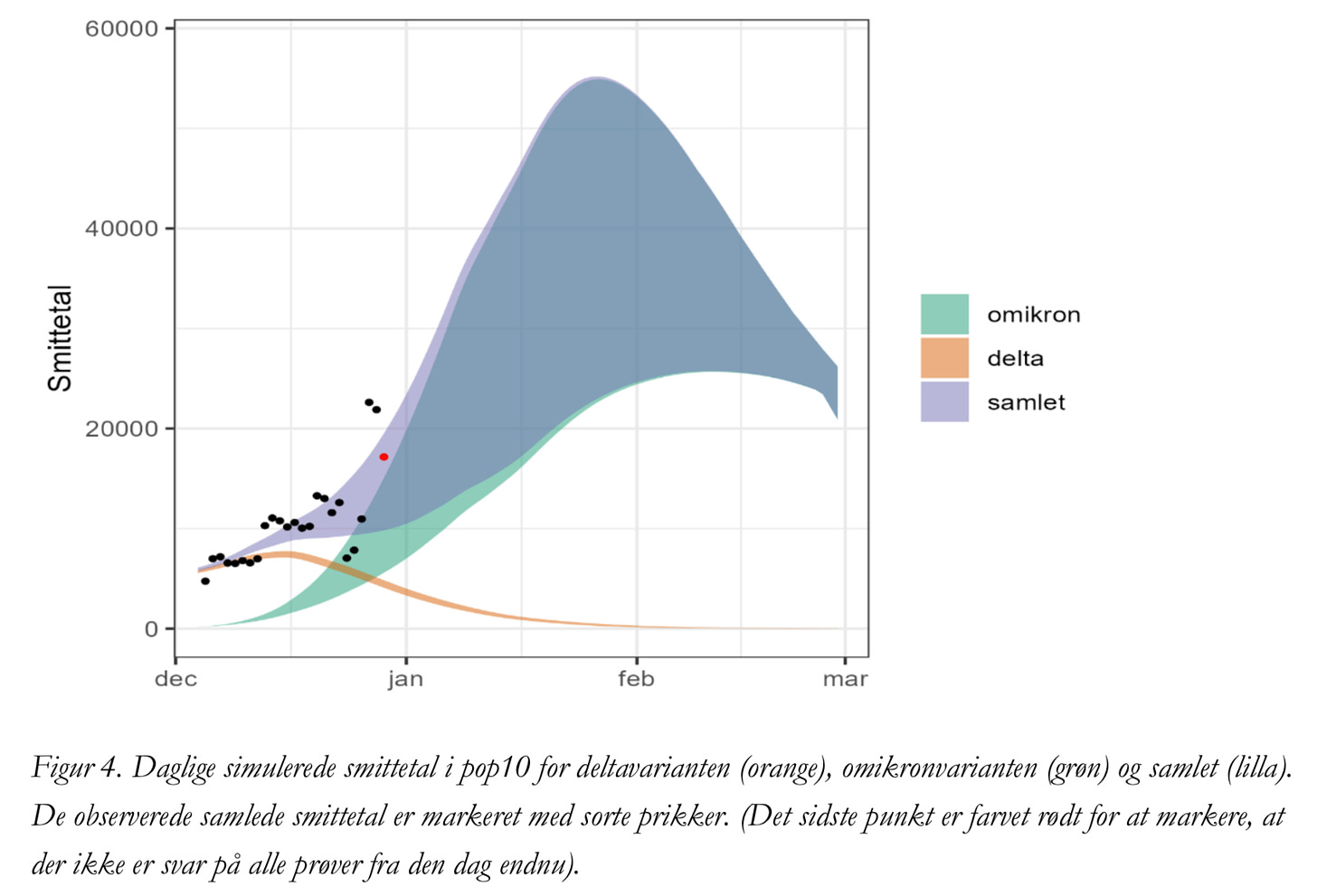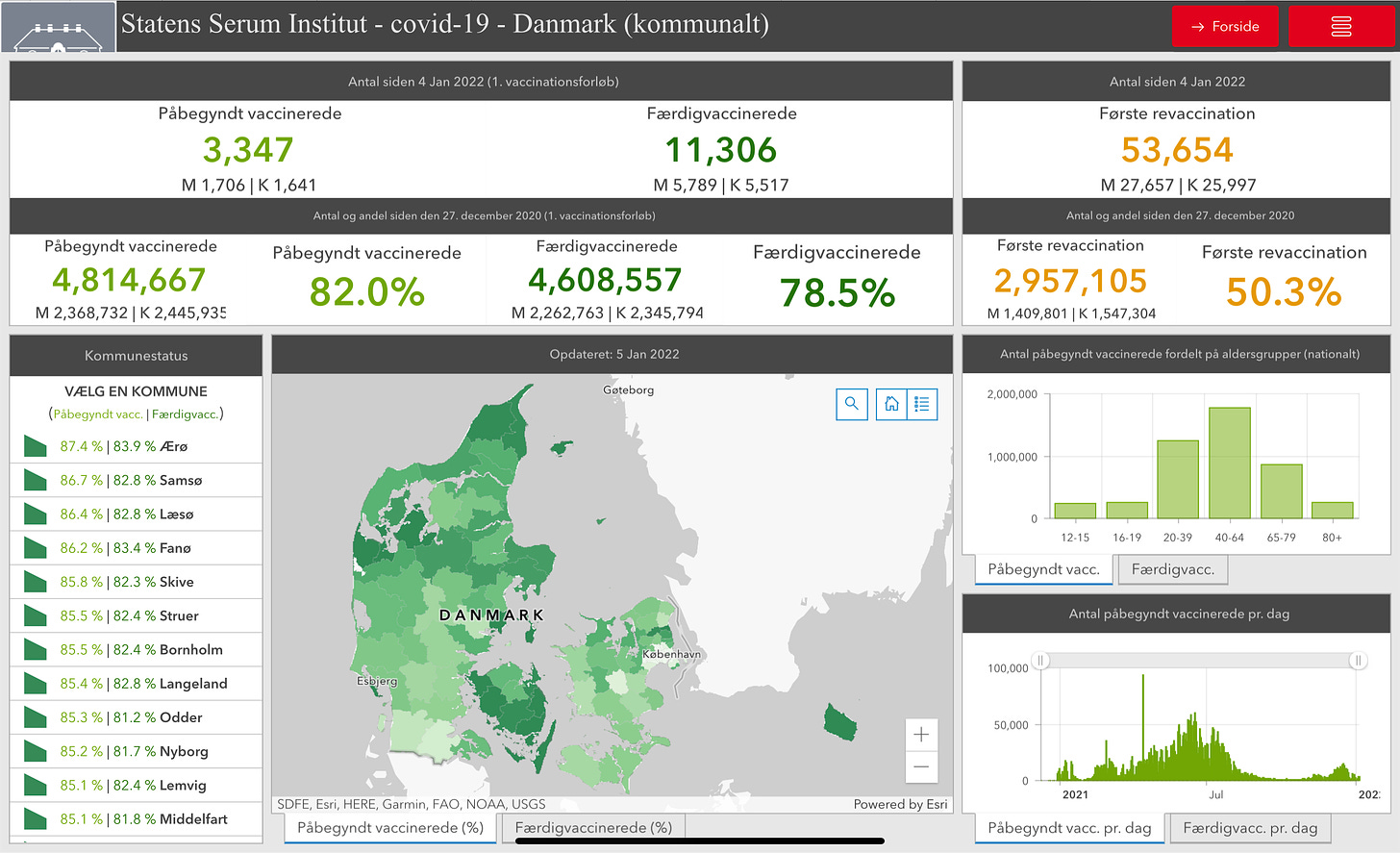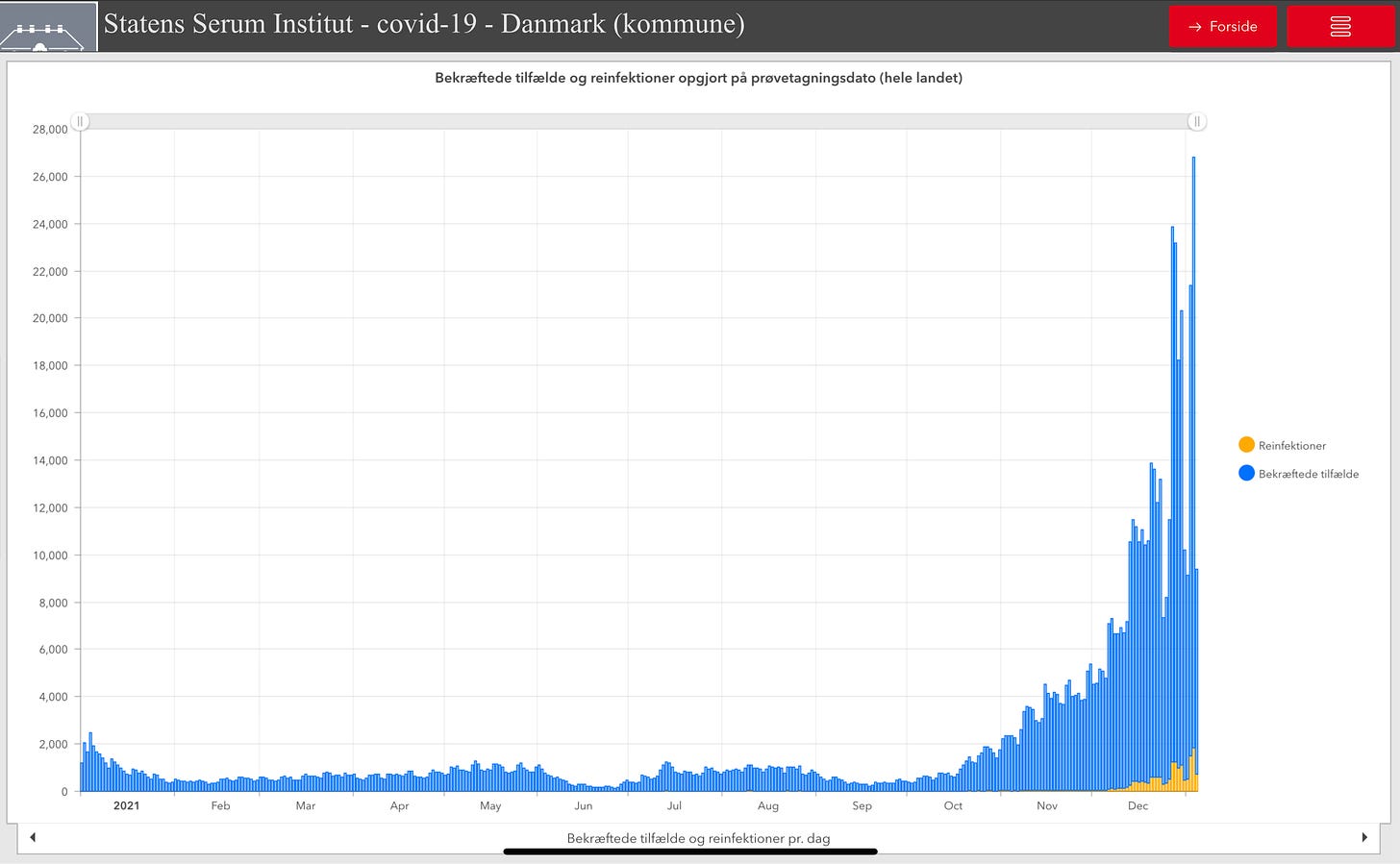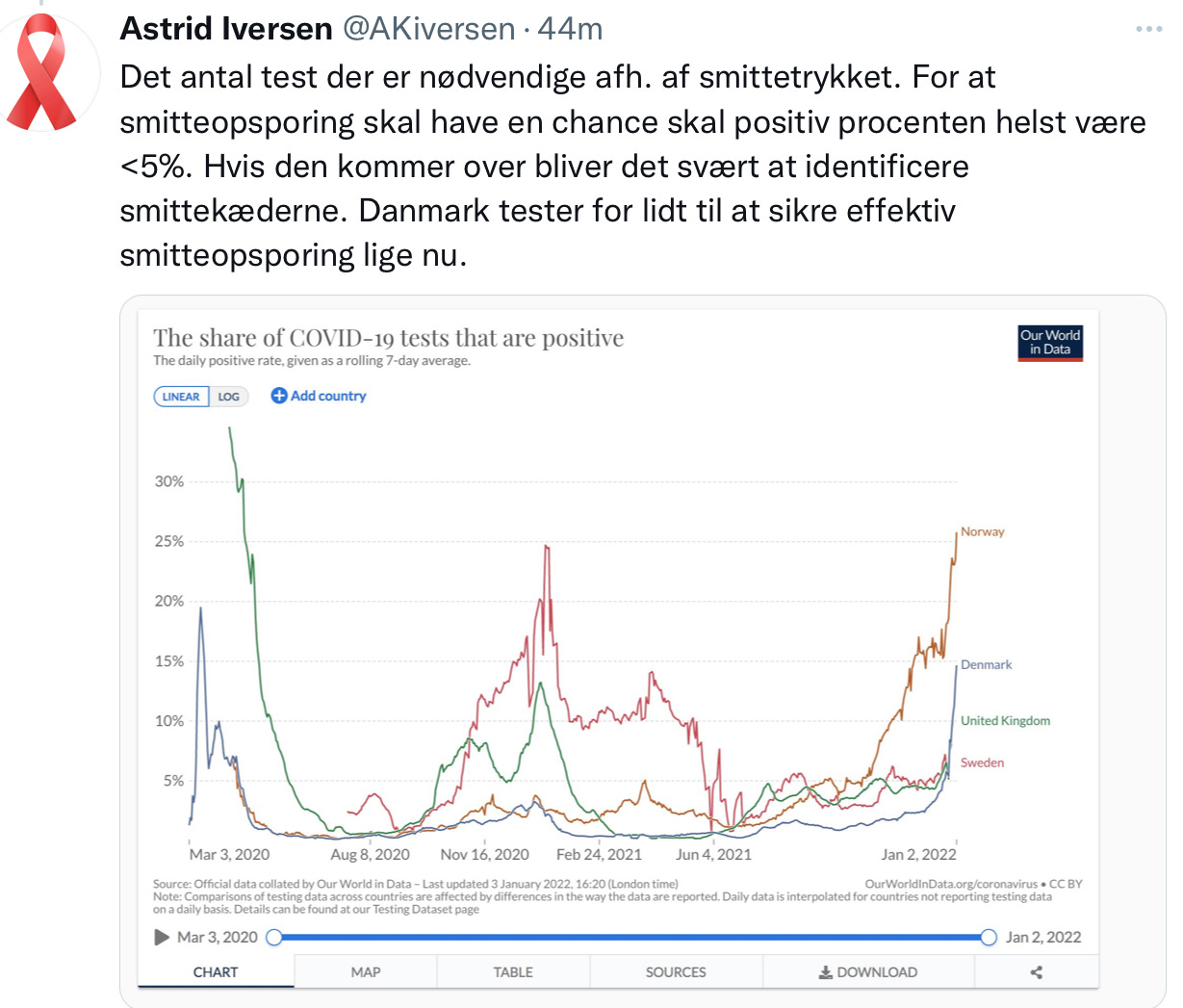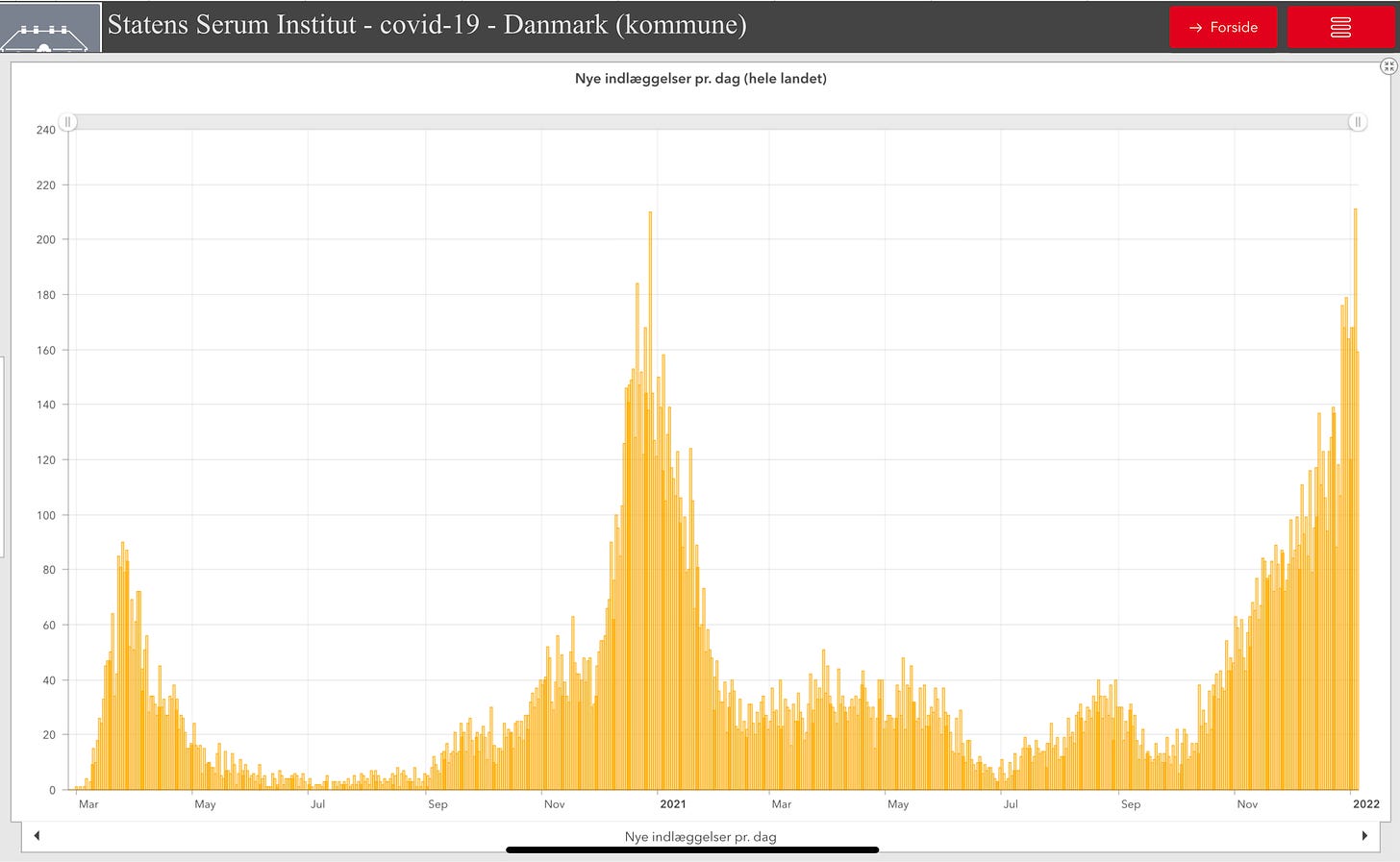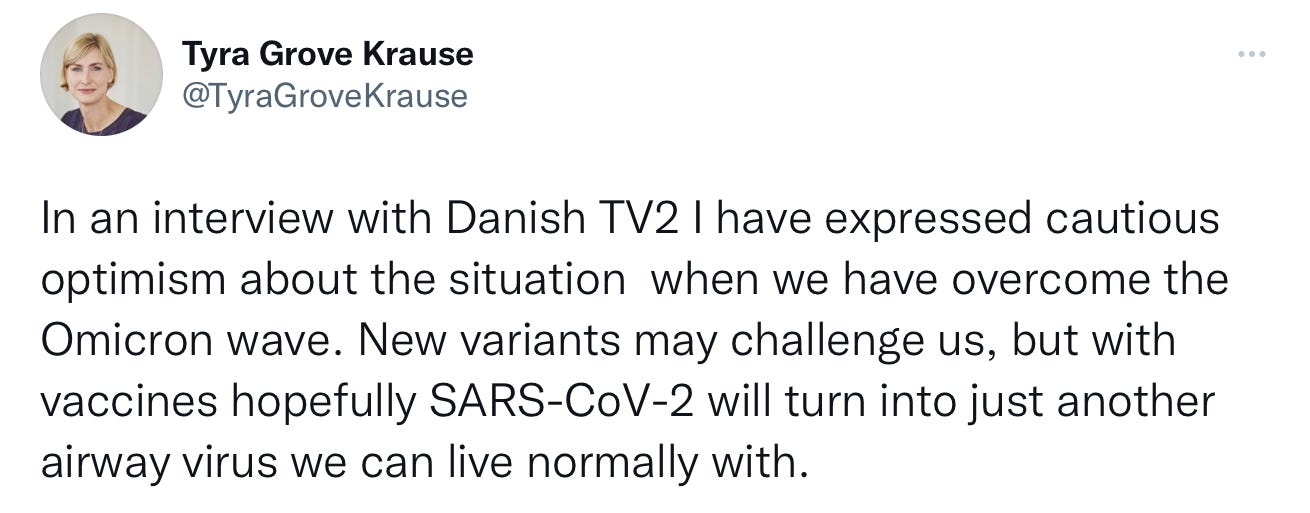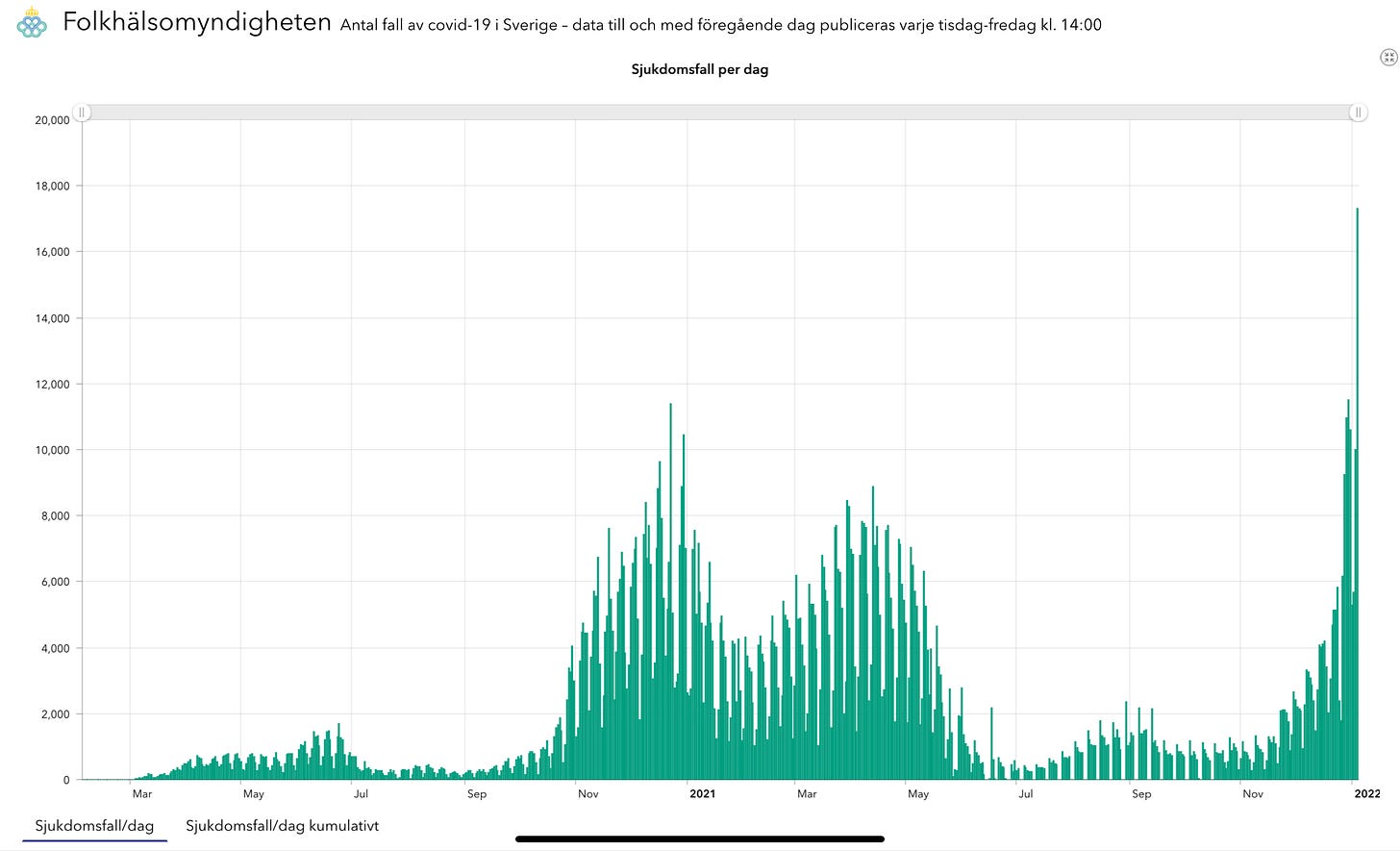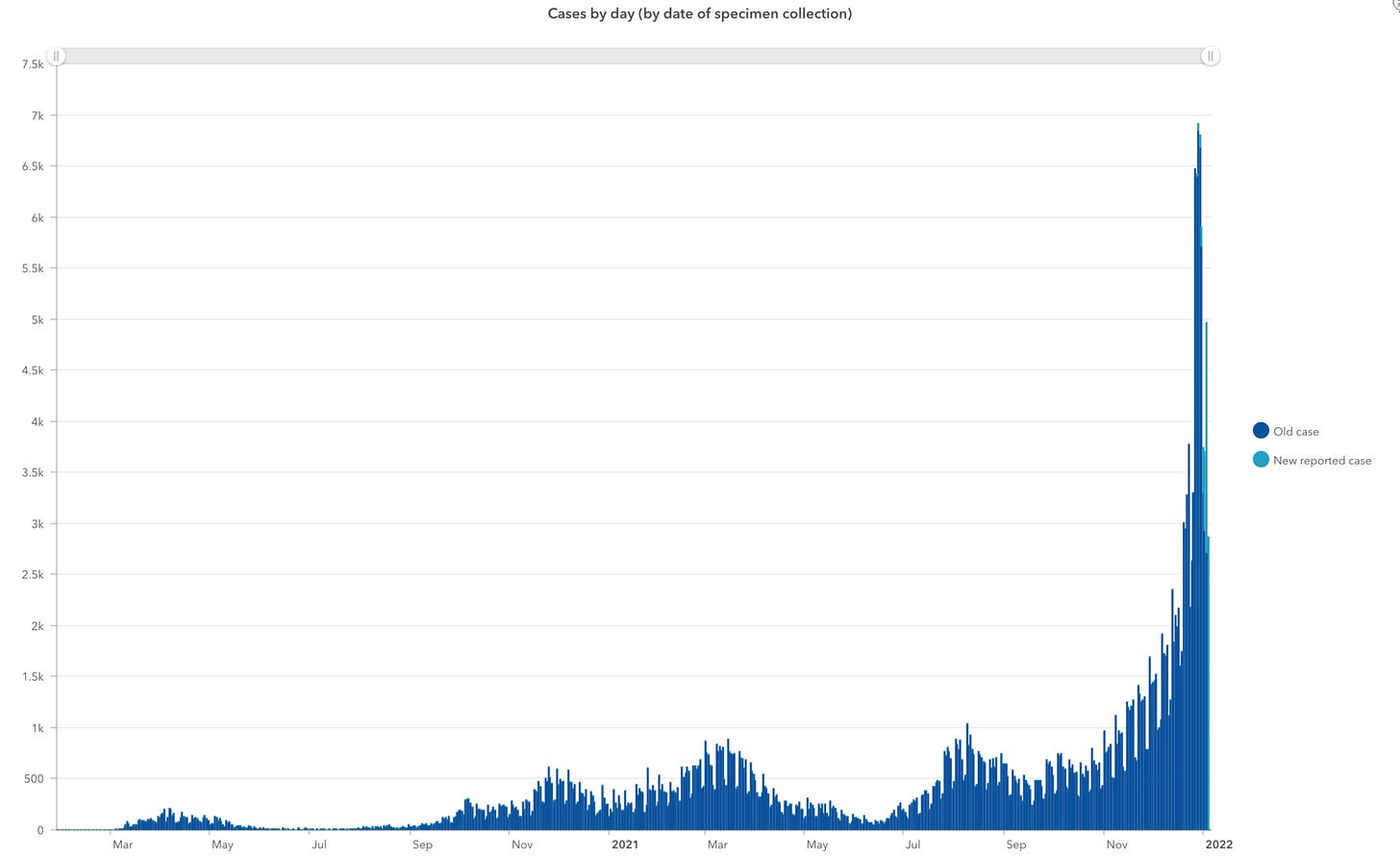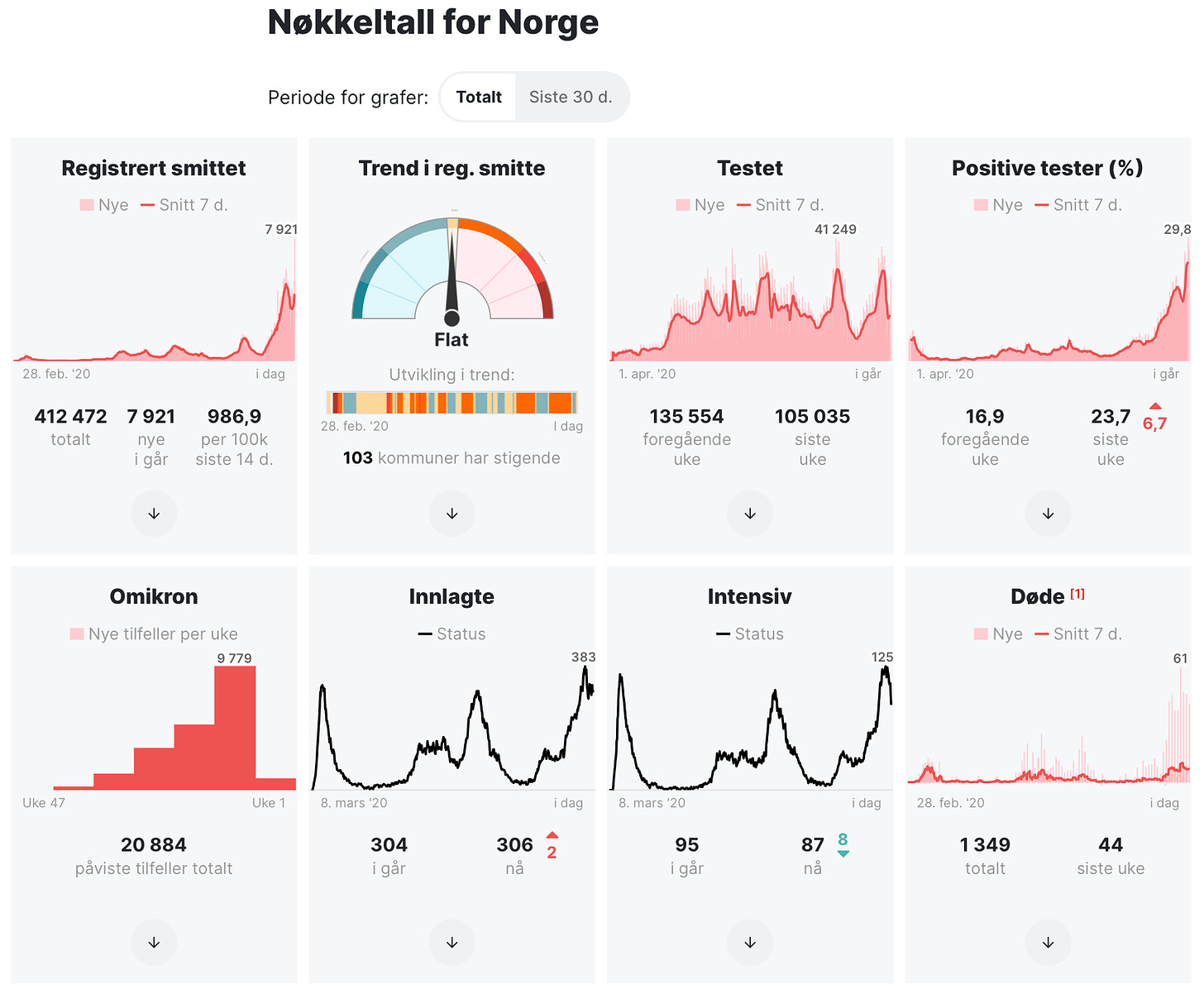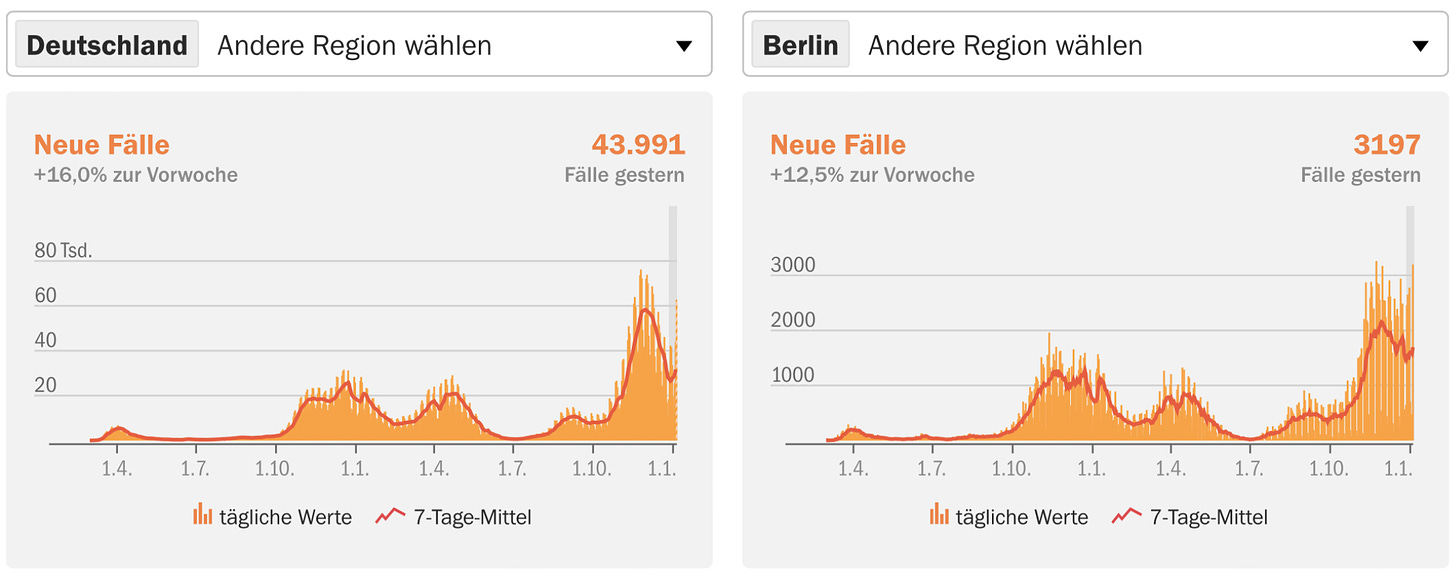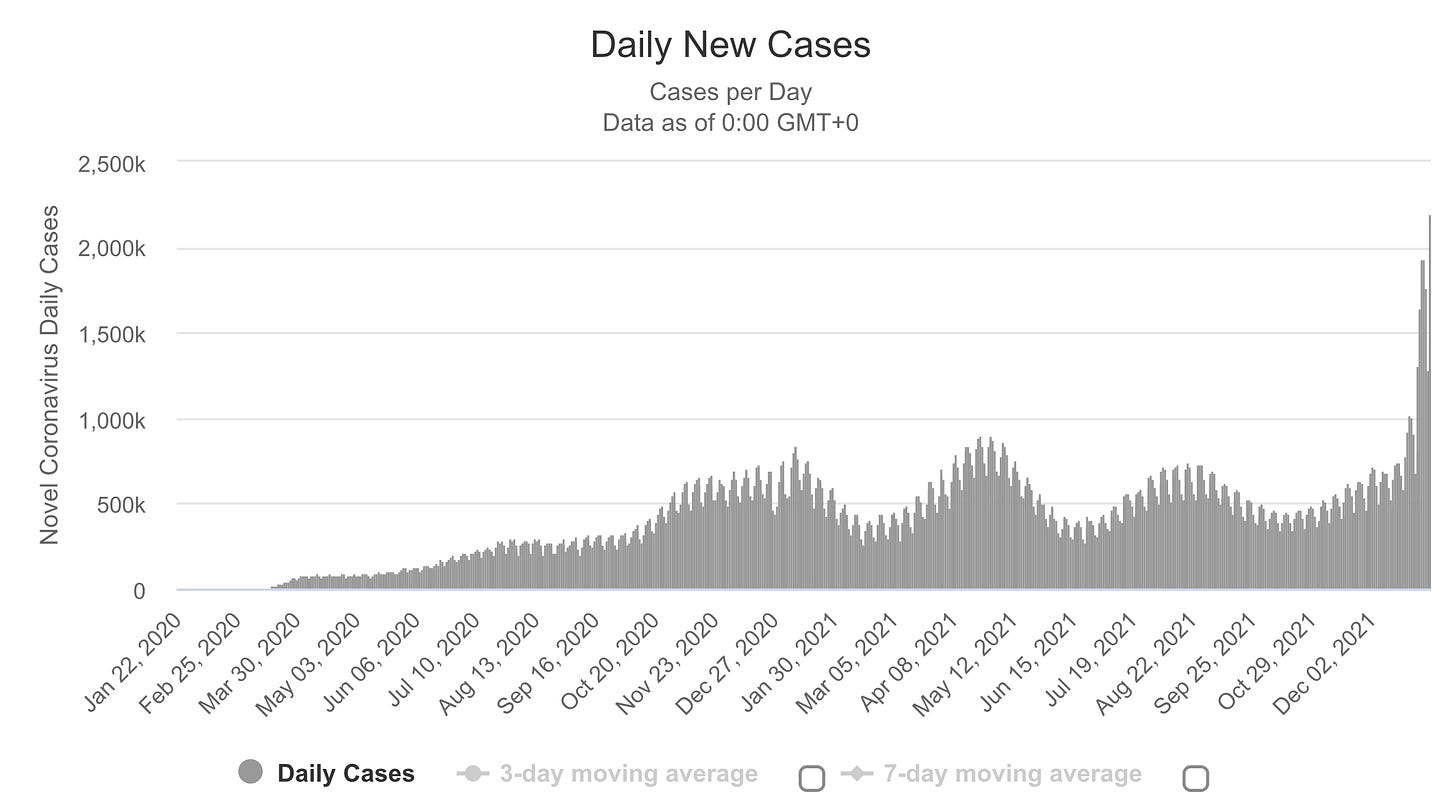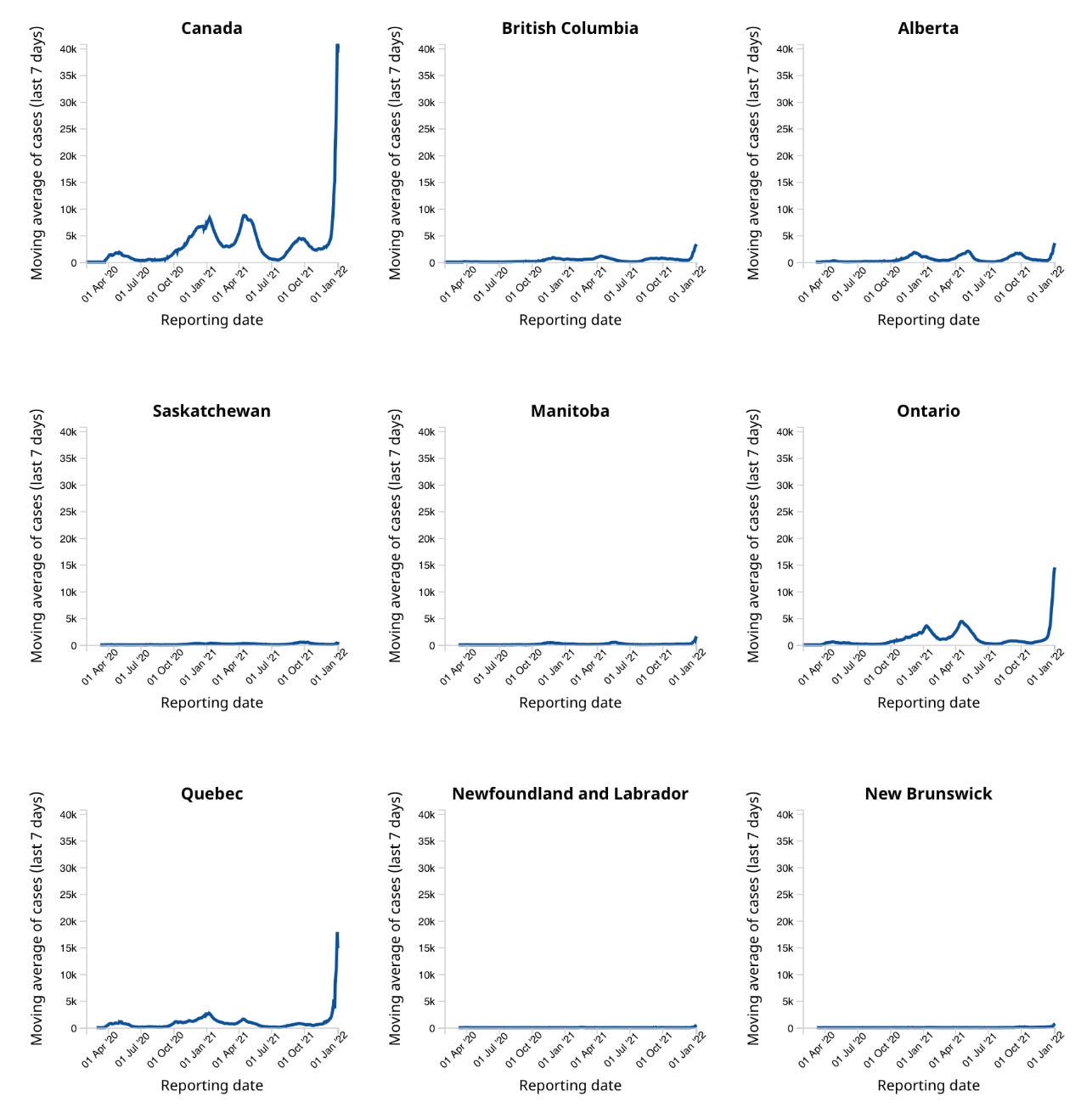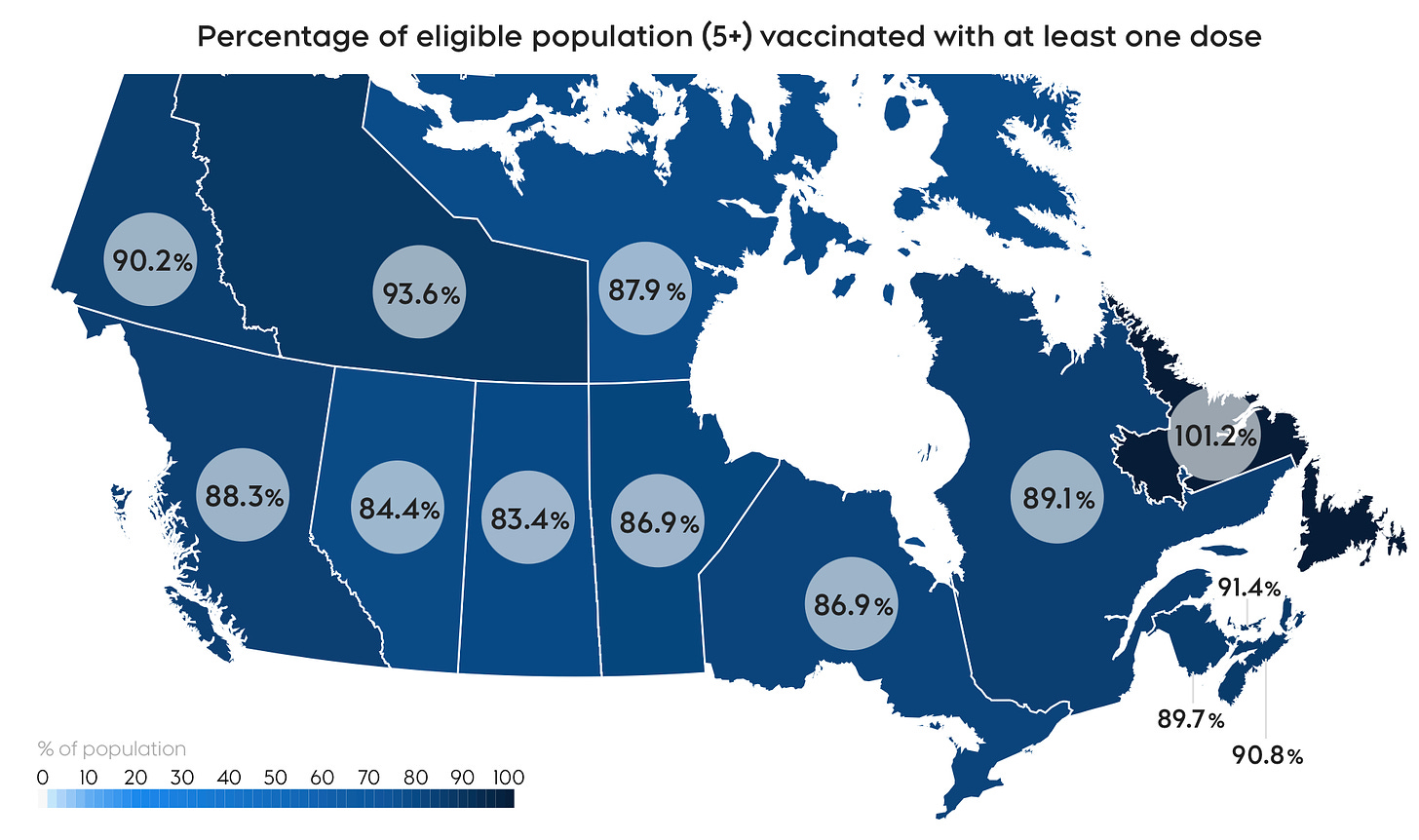🇩🇰
The Staten Serum Institut has tabled a new pandemic threat assessment estimating that by the end of January infections could be between 25,000 to 55,000 cases per day and hospital admissions could be in the 150 to 360 COVID patients per day range.
In its estimations the SSI figures about 25% of the hospital admissions will be people who will hospitalized for something non-COVID related but will then test positive once they have been admitted.
However, SSI Director Henrik Ullum advises taking the projections with caution.
“There is still great uncertainty about the Omicron variant. Therefore, the projected infection rates and daily new admissions should be considered as possible scenarios, but not as [more certain] development forecasts for the coming weeks.”
The agency said earlier this week that the risk of hospitalization with the Omicron variant is roughly half that of the Delta strain. But it is emphasizing in Wednesday’s threat assessment that this doesn’t prevent a sharp increase in hospitalizations based on the sheer number of Omicron infections. The new variant is 3 to 4 times as infectious as Delta.
It is also worth noting the report forecasts Omicron virtually replacing the Delta variant in short order.
-
DR is reporting that the Danish Ministry of Health has recommended tweaking the timelines for immunity on the coronapas.
The recommendation is:
2nd dose immunity would expire after five months (down from seven)
Immunity from a previous infection would last five months (down from six)
The suspension period until a coronapas activates would reduce to 11 days down from the current 14.
-
Denmark has reached another vaccination milestone today as slightly more than half the population has now had a booster shot. To date, 82% of the total population have one vaccine dose, 78.5% have two, and 50.3% have a booster dose.
Yesterday there were 68,307 total inoculations, with most, 53,654 being booster shots. While the numbers as a whole are underwhelming there was a noticeable uptick yesterday with 11,306 2nd doses administered.
-
Denmark’s Epidemic Commission has recommended that all existing COVID restrictions be extended. The commission, which advises on all things pandemic-related, regularly reviews the restrictions. In its recommendation it notes significant infection growth and that restrictions remain necessary to keep them in check. It also notes increasing hospitalizations and primary students returning to school, which will likely contribute to more infection spread.
-
Denmark’s Statsminister Mette Frederiksen addressed the COVID situation in a post to her social media channels on Wednesday. Frederiksen says Denmark continues to see large infection spread and for the duration of winter “the authorities do not expect much lower infection.” That said, the Statsminister adds, there is some hope amid the corona gloom. She says high vaccination rates, a major uptake of booster doses, infection prevention measures, and that the Omicron variant causes less severe disease will “get us wholeheartedly through these months.”
However, Frederiksen offered a cautionary note on the Omicron variant, saying while it might cause less severe disease, the fact it is hyper-contagious poses a threat to the hospital system and society in general.
“If it is allowed to run amok. This can lead to too many admissions at once. And too much and too rapid an infection can also risk closing companies and public institutions. Then there are no people to run the train, take care of children, the elderly, and the sick, or keep the production going.”
On vaccinations, Frederiksen says the booster dose effort has been “simply amazing” with almost 90% of those over the age of 50 having a 3rd shot, a rate that puts Denmark “at the very top” of European and global levels. However, she says vaccination rates remain too low among children and young people.
“With the start of school in mind, I would again encourage parents to consider having your children vaccinated as soon as possible.”
As children return to classrooms, Frederiksen says while it is important that kids have “as normal an everyday life as possible” that at the same time Denmark must avoid having a back-to school infection surge.
“We hope that both children and teachers can make everyday life work under the new conditions with, among other things, more testing.”
She says restrictions have helped put a damper on infection numbers and helped prevent potential super-spreader events. But the Statsminister says the authorities “are continuously considering the situation, which will also be discussed with the parliamentary parties.”
Frederiksen ends her update by saying “it looks better than we could have feared.”
-
Surging infection numbers aren’t just impacting hospitals, as it turns out Denmark’s train system is also being hard hit. The DSB has informed TV2 that it has so many people off sick it has to adjust its train schedules. The area where the schedule will be juggled the most is on the rail lines between Elsinore and Copenhagen Central Station and on to Roskilde.
In addition, regional trains between Slagelse and Copenhagen Airport have been canceled completely.
DSB's communications manager Tony Bispeskov:
“When such situations arise, we look at alternatives and where the fewest [people] are affected. On the coastal line between Copenhagen Central Station and Roskilde, there are other public alternatives. Of course, we want it to have the fewest possible consequences.”
The changes will come into force on Thursday and will remain in place until at least January 23.
-
The pandemic ripple effects are also impacting seniors care in at least one Danish kommune. DR is reporting that in the municipality of Skive seniors are having to wait longer for their homes to be cleaned and a scheme to provide extra home care has also been suspended. It is because of the epidemic situation in the kommune and the number of senior care staff who are on sick leave due to a COVID infection. The municipality told DR that is is reorganizing seniors care services to ensure core care responsibilities are maintained. It is not saying when things might return to normal.
-
Denmark is reporting a record high 28,283 COVID infections, including 2,083 breakthrough infections, and 15 coronavirus deaths in the last day.
Worth noting that it wasn’t just a new record high for the number of daily infections, as a new record high has also been set as measured by testing date, with 24,983 positive results for tests taken on Monday, January 3.
There were 493,010 total corona tests yesterday, of which 231,270 were PCR tests equaling a positivity percentage of 12.22%.
-
Add another voice, a significant one at that, to those saying Denmark is not testing nearly enough people. University of Oxford Virology Professor Astrid Iversen, who graduated from the University of Copenhagen and is a member of Denmark’s COVID expert group, says the high positivity percentage means there are infections escaping detection.
“In order for infection detection to have a chance, the positive percentage should preferably be under 5%. If it goes over, it becomes difficult to identify the chains of infection. Denmark is testing too little to ensure effective infection detection right now.”
-
Hospitalizations (784) slipped a little (-10) while the number of infected people in an ICU (80) crept upward (+3) and of those the number on a ventilator (49) also inched up (+2).
-
The Technical Director of the Staten Serum Institut told TV2 that the Omicron infection wave could be an exit wave moving the country out of the pandemic. Tyra Grove Krause said that we might be able to return to our normal lives within a few months.
“I think it will have that in the next two months, and then I hope the infection will start to subside and we get our normal lives back.”
An assessment from the Staten Serum Institut says that Omicron is here to stay, and it will provide such a huge spread of infection in the coming month that when it's over, we might be better place than we were before. This will be due to immunity from both vaccinations and the sheer number of expected Omicron variant infections.
The story received enough attention that Krause took the rare step of tweeting in English to add some context.
-
Randers Kommune has extended weekly COVID testing to kids in 0 grade despite the Danish National Health Board not including children that young in its testing recommendation.
Municipality's school principal Carsten Fredslund Andersen spoke to Ritzau:
“It is a decision we have made with our eyes open. We find it most appropriate and logical. The kindergarten class is also part of the school. We have not been able to find arguments for not giving them access to weekly testing.”
The National Health Board has advised not to include children in grade 0 because they were transitioning from daycare and placing a testing requirement on them might be too hard on their mental health and school experience.
🇸🇪
Sweden added a record high 17,514 infections and 39 corona deaths since yesterday’s update.
So far, 85.9% of the population 12 years old and older have one vaccine dose and 82% have two doses, and of those 18 years old and older 30.9% have a booster dose.
-
As infections reach record heights in Sweden, the government has decided to extend the use of its vaccine passport system. As of January 12, a vaccine passport will be required for eating in restaurants, all leisure facilities, cultural activities, shopping places, long distance public transport, and venues used for private gatherings.
Minister of Social Affairs Lena Hallengren:
“The COVID spread is increasing in Sweden. We need to be prepared to quickly introduce more accurate infection control measures. The Swedish Public Health Agency is now given the opportunity to introduce vaccination certificates in more activities where the risk of spreading the infection is high.”
Some flexibility is built in allowing public healthcare authorities to further extend vaccine passport requirements depending on the pandemic situation.
There are some exceptions including young people under the age of 18, and that a vaccine passport cannot be used to deny access to essential shops or medical care for anyone who is not vaccinated.
Sweden adopted the use of vaccination certificates on December 1 and has until this point only required them for public gatherings and indoor public events.
-
Hospitals in Sweden’s capital region are under strain as the Omicron variant drives numbers sharply upward. Region Stockholm has now taken steps to prioritize necessary and emergency medical cases. This means all non-urgent procedures have been postponed. Currently, there are 281 COVID patients in hospital with 31 requiring intensive care.
Chief Physician Johan Bratt says concerns are running high as the Omicron surge arrives at exactly the wrong time. He says as people return from holidays, many will be sick with coronavirus, influenza, or other maladies and will seek care further straining the system. Hospitals are also struggling with staffing challenges as staff isolate at home either with COVID or having symptoms that could be the virus. Bratt says this is on top of a rapid increase in infection activity.
“With so many more infected, some will have such a serious illness that they will need hospital care. Therefore, the rapid increase in infection is very worrying and we must prepare for the fact that it will take time before we see that the occupancy rate of patients with COVID at our hospitals decrease. We spend a lot of time coordinating all the hospitals' resources and overall there are vacancies for everyone who needs urgent and necessary care. It is very important that those who have acute symptoms seek care. This reduces the risk of more serious illness or death. It is also important that care employees get the leave and recovery they so desperately need. We do not want to staff care places that are then not needed. We therefore have a high degree of flexibility to be able to quickly [if necessary] increase [and reduce] the number of staffed care places at each hospital.”
He urges people to get vaccinated and if they are not, they should be very careful with their social contacts. They should also stay away from vulnerable and high-risk groups like seniors over the age of 70.
-
The Swedish Public Health Agency is ruling out mass testing of students and teachers as both Denmark and Norway recommend twice weekly testing to screen for infections in schools.
Agency Department Head Britta Björkholm said while schools can certainly employ infection mitigation efforts mass testing is not in the cards.
“We do not feel it is justified here and now. Above all, it will be a point in time effort and a measurement opportunity that only applies when the test was taken. We do not think doing it once is an effective measure.”
🇫🇮
Finland registered 6,791 infections and 25 more virus deaths in the last day.
Hospitalizations (469) have rocketed up (+71).
To date, 77.4% of the total population have one vaccine dose, 73.8% have two, and 22% have a booster dose.
-
The Finnish Institute for Health says as infections rise there is an “alarming” pressure on the country’s hospitals. In its latest weekly assessment, the health agency says there were 38,700 new COVID infections last week, compared to 19,600 the week before. It says the burden on hospitals is rising with pressure remaining “at its highest level” on intensive care units.
The institute says the rate of positive test results has more than doubled. Between December 26 and January 1 there were more than 147,200 COVID tests taken with a positivity percentage of around 26%. That is more than double the positivity percentage of 11.8% in the week previous.
“The whole of Finland now matches the characteristics of a community transmission area.”
In the last two weeks, Finland has recorded 104 more coronavirus deaths, with the health agency saying people over the age of 70 account for 76% of those pandemic fatalities.
🇳🇴
Norway has added a record high 7,921 infections and 42 more pandemic deaths since yesterday’s update.
COVID hospitalizations (306) are up (+2) ICU while the number of infected people in intensive care (87) is down (-8).
To date, 79.5% of Norwegians 12 years old and older have one dose, 72.8% have two, and 30.5% have a booster shot.
🇩🇪
Germany’s Chancellor will meet with regional leaders on Friday to discuss how to combat spreading Omicron variant infections. On the table will be the possibility of further tightening COVID restrictions.
Health Minister Karl Lauterbach spoke to the RedaktionsNetzwerk Deutschland media group:
“Tightening [restrictions] will unfortunately be necessary to counter the heavy infection wave that is coming our way.”
While infections declined in Germany in December since coronavirus restrictions were introduced, infection activity over the last week has again begun to pick up. Germany’s Robert Koch Institute reported 58,912 new corona cases and 346 more deaths on Wednesday. That is a 47% increase in cases from a week ago.
🇫🇷
France smashed all previous daily pandemic infection numbers with a record high 332,252 new infections and another 246 corona deaths on Wednesday.
-
France has issued new guidelines allowing infected healthcare workers to continue working provided the situation at work is so desperate they are needed. The provision also says this only applies to those who have mild or no symptoms. They should avoid contact with anyone who is unvaccinated or is considered high-risk. They must also minimize all contact with unmasked co-workers as best they can. France currently mandates a five day quarantine period for vaccinated people who test positive and seven days for those not vaccinated.
🌍🦠
The Omicron variant is driving daily global infection numbers into the stratosphere as the world registered a record breaking 2,197,669 new infections on January 4.
These numbers are underreported due to a variety of reasons not the least of which are some countries manipulating data.
🇨🇦
The Trudeau government announced on Wednesday that 140 million COVID rapid tests will be distributed to the provinces and territories. That would be quadruple the amount initially promised by the federal government.
Prime Minister Justin Trudeau also added that Canada will have enough pediatric doses of the Pfizer/BioNTech vaccine by the end of January to vaccinate every eligible child in the country.
-
Canada reported 37,410 new COVID infections and another 57 coronavirus deaths. Its infection numbers are almost certainly very understated due to concerning testing issues across the provinces.
The Canadian vaccination effort has so far administered 31,520,154 1st vaccine doses (82.4d% of the total population) while 29,455,644 people (77.04%) have two doses, and of those 8,562,751 are fully vaccinated with three doses.
Due to maxed out or totally collapsed testing regimes the COVID numbers below are likely vastly underreported.
In Ontario today there were 11,582 infections and 14 more deaths. The province has a positivity percentage of 28.1%. There are 2,081 people in hospital and 288 in the ICU, of which 202 either have one dose or none at all.
Quebec reported 1,750 COVID infections and 39 deaths, the highest number of fatalities in a day in almost a year. The province will distribute 7 million rapid tests to schools ahead of a January 17 return to class.
In Atlantic Canada, New Brunswick has 779 new corona cases and three more deaths. Nova Scotia has 842 new infections. Newfoundland and Labrador had 493.
Manitoba saw 1,790 new virus cases and two more deaths. Pandemic related staffing shortages have forced the Chief of the Winnipeg Police to declare a state of emergency.
There were 537 infections in Saskatchewan. 106 people are in hospital and 13 in intensive care. Of the 106 hospitalized, 54.7% were not fully vaccinated.
Since December 31 and covering a four day span Alberta has logged 12,965 corona infections and 12 more deaths including a child under the age of ten. There are 436 people in hospital with 16 in intensive care.
B.C. recorded 2,542 infections and four deaths on Tuesday. There are 298 people hospitalized including 86 in intensive care.




